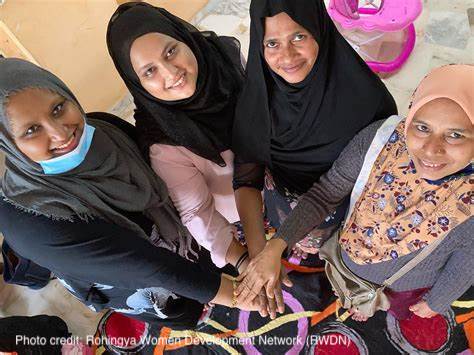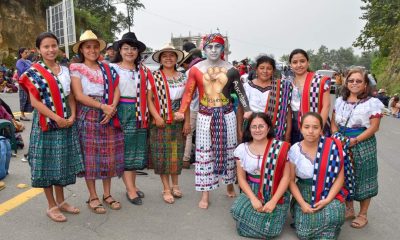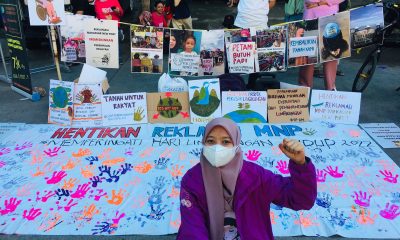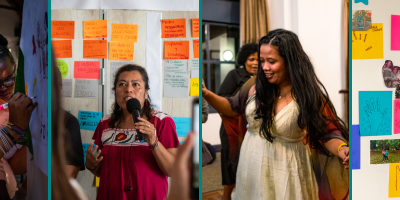By Laura Carlsen Km. 148 is a nodal point on the Interamerican Highway that connects…

Interview with Sharifah Shakirah, Rohingya woman leader from the Rohingya Women Development Network (RWDN)
Can you tell us about yourself? Can you describe the work that you do in RWDN?
My name is Sharifah Shakirah. I was born in Burma. At the age of five, I had to flee my country because of the decades-old persecution of Rohingya people by the State. I was living in Malaysia until recently, and resettled in the United States (US) in 2019.
The 2012 crackdown in Myanmar saw many Rohingyas trying to leave the country while many others were killed. During this time, I was giving a lot of interviews to the international media to bring attention to what was happening with my community.
In 2015 and 2016, the ongoing persecution also saw many womxn and girls being killed and subjected to physical and sexual violence, detention, and trafficking. As a Rohingya womxn, I felt that we needed a womxn’s organization to provide support to Rohingya womxn and girls. That is how our organization, the Rohingya Women Development Network (RWDN), was established in Malaysia. It was the first Rohingya womxn-led organization as well as the first refugee womxn-led organization in Malaysia.
Presently, the RWDN is an international network led and informed by Rohingya womxn. The US provides us with the opportunity to access freedom, rights, and education. However, we still need support and systems for the larger Rohingya community. On the ground, our organization works to extend socio-economic support to womxn and girls. We want to become self-sufficient as a community. We are currently working in Malaysia and the US to strengthen and develop the Rohingya community through education, skills training and advocacy.
What are you fighting for? What are you fighting against?
The genocide against the Rohingyas is ongoing in Myanmar. Our people have been trying to escape the persecution, the violence, and trying to seek refuge wherever possible. Unfortunately, countries like Malaysia, Bangladesh, India, and Indonesia do not recognize the refugees in their country. This means that there are no rights or State’s support for the Rohingya refugees.
As an organization, we try to provide support to address the needs of the community. The Rohingya people have trauma from the violence they have seen or faced. We are trying to return home, return to our land. Nobody wants to live in a country where we feel that we are not welcomed. We want to go home. We need to continue speaking up, wherever we are. Even as we fight for justice, we see our communities, our homes destroyed.
What are the main demands of the Rohingya women?
We seek freedom for ourselves. We demand justice for womxn who are being used as a weapon. We want our rights to be recognized and to be treated as equals in our country Myanmar. We want education for our children and for ourselves. We want to have the opportunity to study, to be able to speak, and to be empowered.
We want to be heard. We want to be equally involved in all decision-making processes, because we are victims of genocide. At the same time, we want to be respected for who we are. We do not want to be abused in our own home. We don’t want to be taken advantage of by being a womxn or a girl in our community. We want to be respected and seen as equal to other human beings.
What is your message to fellow Rohingya womxn? To all the womxn of Myanmar?
My message to my fellow Rohingya women is to not give up. We have demands. We have things that we want. But first, we need to know who we are, how beautiful we are, how capable we are, and how strong and brave and resilient we are. With that, we cannot give up, because if we give up, everything will be destroyed. We have to be tough and believe and know that we are capable of it. We need to put ourselves first and love ourselves first. Many of us think that we are the last priority, and we are only made to stay in the kitchen and take care of the kids. But being a woman and a mother and living in the community, I know we are much more than that.
Second is that we have been using our strength for our family. We have to recognize that we are the warriors behind our family, our community, and our society. Let us not let people misuse us. Let us not let people take advantage of us. Let us not let people exploit us. Let us be who we are, the strong warrior. Let us fight forward. We know that we are more than just genocide survivors. We are more than just refugees. We are more than just a mother or a wife. I want my fellow Rohingya women to recognize this strength that we have. We are the backbone and the warriors of our community. We need to really believe in that.
My message for my sisters in Myanmar, to all our ethnic sisters, is that we need to be there for each other. Let us not let anyone, any men, divide us. They make us feel hate for each other. We are people who give love, and we care. These are the characteristics that we have, and we should show those characteristics, the love, the kindness, to each other. Let us see each other as the same sisters from our country. We have to join hand in hand to end this violence happening among us. We need each other.
What is your message to the international community?
I want the international community to open their eyes and see what is happening to us. We need help, we need services, and we need aid. Without your help and solidarity, the fight that we are fighting is not going to be successful.
Education is the long term solution for our community. We want to be empowered. We want to be taught how to ask for our rights, rather than being told what to do and what not to do. We want to be able to make our own decisions. Education is the only thing that would allow us to recognize our rights and use our voice in the battle we have been fighting for decades.
Solidarity is very important. Everyone needs to understand our situation. There is a lot of propaganda against the Rohingyas. You need to hear from the Rohingyas themselves. We are the victims. We’ve been abused. We’ve been persecuted. You need to hear the truth and share our story with whomever you know, because the world needs to know what is happening. The genocide is taking place in Myanmar, and it needs to stop. Everyone needs to take action – small or big. It’s all needed.
I hope that you will see a refugee in your country as equal to others. That you see them as humans, at least, and that they are capable. No refugee, no Rohingya, goes to a country to take away other people’s opportunities. Our country kept us out. They were persecuting us. They forced us to leave. This is why we went to another country to protect our family—to find shelter and a safe space. But we would like to contribute as much as we can to your country. Please allow us to do that. Accept us. Welcome us.
———–




























